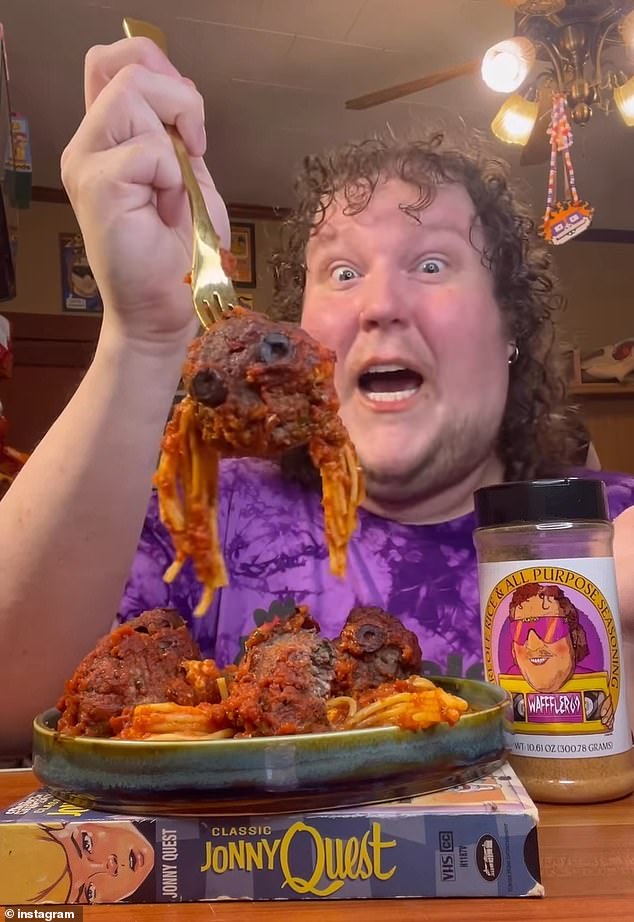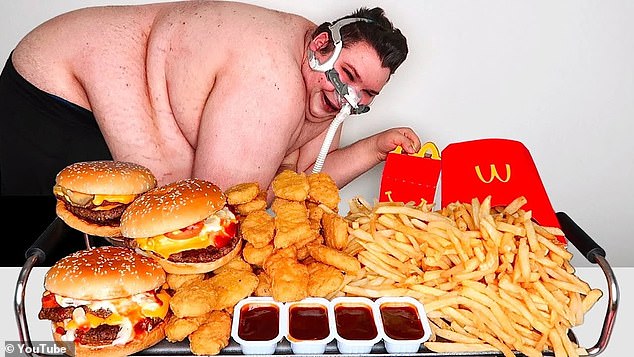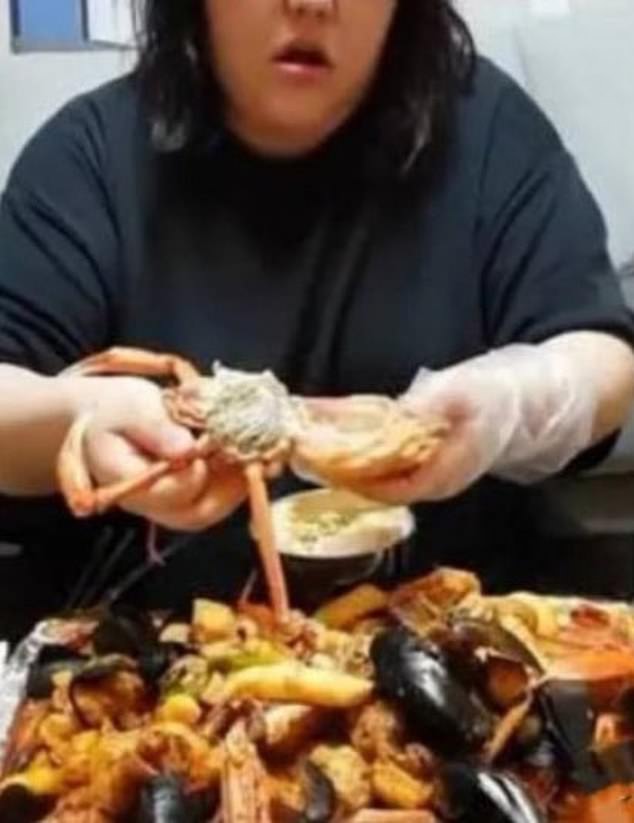Inside the dangerous world of extreme eating: After 24-year-old dies during 10-hour food binge livestream, how internet stars are making millions from overconsumption on camera – as experts warn mukbang clips ‘glorify self harm’
The dangers of extreme eating have once again hit the headlines following the tragic news that a 24-year-old died while live streaming a 10-hour binge last week.
Chinese content creator Pan Xiaoting died of a suspected stomach rupture after eating about 10kg of food.
According to the autopsy results, her stomach was severely deformed and full of undigested food. This suggests that her stomach may have burst, causing stomach acid and food to leak into her abdomen.
Xiaoting became famous in China for her livestreams, in which she ate huge amounts of seafood and chocolate cake on camera, among other things.
She is said to have been hospitalized after suffering a stomach bleed from overeating, but it is suspected that she began binge eating again just one day after being discharged from the hospital.
Chinese content creator Pan Xiaoting (pictured) tragically passed away last week at the age of 24 while livestreaming a 10-hour binge
The trend of making food videos – known as mukbangs – originated in South Korea and was initially aimed primarily at people who wanted to eat with the content creators.
The trend has become more extreme, however, with Mukbangers eating increasingly large quantities of often unhealthy food. Doctors warn that even more people could die.
Xiaoting is not the first creator to die at a tragically young age from eating to attract viewers.
In January 2023, TikTok star Taylor Brice LeJeune (known online as Waffler69), who had approximately 1.7 million followers on the platform, died of a suspected heart attack.
Taylor, who was just 33 when he died, was known for his quirky food review videos, in which he consumed both novelty and expired products, including 1990s Addams Family promotional products.
Online, he ate large quantities of canned cheeseburgers and a gigantic Froot Loop, among other things.
Speaking to MailOnline after Taylor’s death, British GP Dr Zak Uddin said: ‘We are not on the eve of an obesity epidemic, we are in the midst of one.
‘That we therefore glorify enormous calorie intake or even binge eating is crazy, isn’t it? You normalize the abnormal.

Another content creator who engaged in extreme eating and died at a tragically young age was Taylor LeJeune (pictured), who was 33 when he died of a suspected heart attack.
“As a society, we enjoy the abnormal or the obscene. That’s not new. If it’s a freak show, people will gravitate toward it.”
Perhaps the most famous Mukbanger on YouTube is Nicholas Perry, better known as Nikocado Avocado to his 3.8 million followers on YouTube.
When he started his YouTube channel in 2016, the then-vegan content creator weighed approximately 165 pounds.
However, he abandoned his plant-based diet and began filming himself eating massive amounts of food, mostly junk or fast food, including huge platters of hamburgers.
The 32-year-old Pennsylvania man now reportedly weighs about 350 pounds and has gained nearly 200 pounds in recent years.
He is also thought to have sleep apnea, a condition in which sufferers stop breathing during sleep and which has been linked to obesity, as he often wears a CPAP machine in his videos, which is also used by people with the condition.
During his dramatic music videos, which have made him a multimillionaire, Nicholas often eats more than 10,000 calories in one sitting.
General recommendations (which are only guidelines, as height, weight and your activity level are factors that affect how many calories you need) suggest that men should eat about 2,500 calories daily and women 2,000.
Although the trend is becoming increasingly popular, it is not new: back in 2019, health experts warned about the dangers of extreme eating.
In addition to Mukbang videos where content creators eat massive amounts of calories, there is also other extreme eating content, such as calorie challenges (which are popular among fitness enthusiasts who indulge in “cheat days” where they eat more than 10,000 calories) and competitive eating videos.
Dr Naveed Sattar, professor of metabolic medicine at the University of Glasgow, said the Telegraph that this type of content conveys the message that ‘eating excess calories is fun’.

One of the most famous YouTube Mukbangers is Nicholas Perry (pictured), known online as Nikocado Avocado. He has earned millions of dollars from his extreme eating videos

In a typical Mukbang, Nikocado Avocado (pictured) will consume large amounts of often unhealthy foods

BEFORE: At the start of his YouTube career, Nikocado Avocado weighed around 160 pounds – he’s reportedly gained around 200 pounds in recent years
He continued: ‘The message it sends to people is that eating excess calories is a fun thing to do, which is not good because many people are fighting to not gain weight.
‘If you eat large amounts of it, the fat content in the blood increases and the risk of a heart attack is greater in sensitive people.
“The message it sends to society is the same as when people overindulge in alcohol and glorify it.”
He concluded that this glorification of binge eating is ‘wrong’ and sends a bad message to society.
Dr Andrew Harris, senior lecturer in psychology at Nottingham Trent University, also believes this type of content can be dangerous.
Dr Harris said after Pan Xiaoting’s death: ‘Mukbang videos revolve around consumption and excess, potentially reinforcing a cycle of overeating and unhealthy relationships with food.’

It is reported that Pan Xiaoting (pictured) weighed approximately 660 pounds (300 kg) at the time of her death

The 24-year-old content creator (pictured) made live streams in which she ate for up to 10 hours
He added: ‘Some research suggests that watching mukbang videos can alleviate feelings of loneliness by providing a sense of social connection or camaraderie, but other research suggests that excessive viewing of these videos may actually worsen loneliness by replacing deeper real-life social interactions with more superficial virtual ones.’
Moreover, he said, seeing people gorge themselves on unhealthy foods can reinforce unhealthy eating habits.
The videos “are about consumption and indulgence, potentially reinforcing a cycle of overeating and unhealthy food relationships,” he added.
Dietician Katie Lopez agreed, describing the videos as a horrific display of gluttony and self-harm, telling MailOnline they were ‘yet another example of the glorification of self-harm’.
She added: ‘More specifically, these people are at risk of gastric perforation, significant elevations in glucose and lipids, acid-base disturbances, electrolyte disturbances, dehydration and cardiac arrhythmias.’
